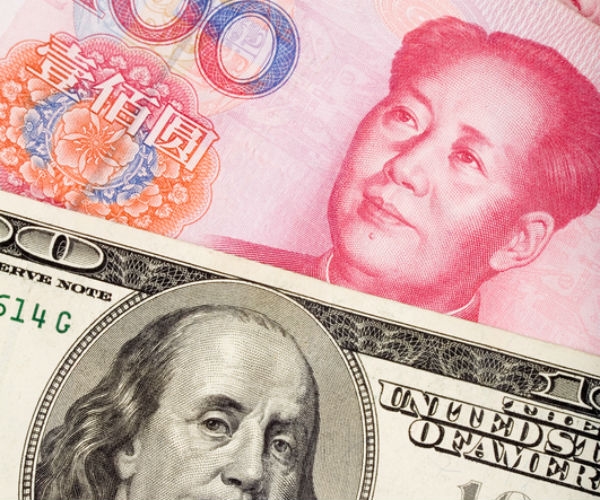Deutsche Bank experts warn savvy investors that President Donald Trump most likely will soon fulfill his campaign vow to label China a currency manipulator.
"Some time in the next couple of weeks, we think it is likely that President Trump will declare China a currency manipulator and propose penalties if it does not enter into negotiations to lower its trade surplus with the US," the team led by Michael Spencer, chief economist at Deutsche Bank, wrote in a note to clients last week, Business Insider reported.
"This has been a consistent campaign promise and he has demonstrated since taking office his determination to deliver on his promises, however controversial," the bank’s note read.
"Existing US law and its application by the Treasury in recent years are unlikely to satisfy the President's desire for strong penalties for unfair trade, so we anticipate that the proposed measures could go far beyond what has thought possible even a few weeks ago," the bank's note read.
China, the world's second-biggest economy behind the United States, has been trying to control the rate of its currency's depreciation since 2014, and it has had a harder time keeping it stable in trade-weighted terms since mid-2016, BI explained.
The U.S. hasn't declared China a currency manipulator since 1994.
BI also tackled the question of if Trump does label China a "currency manipulator," how will China respond?
"In the trade policy realm, the authorities have signaled that they'll respond with tariffs in proportion to the US move. So a sector-by-sector application of anti-dumping tariffs, for example, will likely be met by a similar response from China. An across-the-board tariff on all imports from China would likely be met by a similar response on the Chinese side,” the Deutsche Bank note read.
“But we think China's currency policy is unlikely to change materially in the event it is labeled a currency manipulator. We do not expect them to refrain from intervening and move to free float — which would likely lead to a large depreciation — nor would we expect a one-off devaluation. The authorities have had three years to allow a large sudden depreciation and even the modest 3% devaluation in August 2015 seems to have been too much volatility for them. At most, a controlled depreciation such as we observed in the first half of 2016 would be possible, in our view," the Deutsche Bank note read.
Gary Hufbauer, an expert on trade law at the Peterson Institute for International Economics, recently told the Associated Press that as president, Trump could nonetheless escalate any dispute over the currency on his own. Over the years, Congress has ceded the president broad authority to impose trade sanctions. Trump has threatened to slap a 45 percent tax, or tariff, on Chinese imports to punish it for unfair trade practices, including alleged currency manipulation.
Brookings' Dollar said China likely would bring a case to the World Trade Organization "against any protectionist measures that are a violation of U.S. commitments to the WTO," which oversees the rules of global commerce and rules on trade disputes.
Some trade analysts wonder if Trump is using the tariff threat as a negotiating tool to win concessions from China.
Whatever the U.S. motive, China has a consistent record of retaliating against trade sanctions. When the Obama administration slapped tariffs on Chinese tire imports in 2009, for instance, China lashed back by imposing a tax on U.S. chicken parts.
China's Global Times newspaper, published by the ruling Communist Party's People's Daily, has already speculated that "China will take a tit-for-tat approach" if Trump's tariffs are enacted. The paper suggested that Beijing might limit sales of Apple iPhones and Boeing jetliners in China.
"The Chinese are predictable and reliable," DeBusk said. "If they get punched, they punch back."
However, the Trump administration isn’t the first to accuse other countries of foreign-exchange shenanigans. The Treasury Department under President Barack Obama in October published a report that named China, Germany, Japan, South Korea, Taiwan and Switzerland as possible manipulators.
“That is because the first five all have large bilateral trade surpluses with the U.S., while Switzerland has a current account surplus and has ‘engaged in persistent, one‐sided intervention in foreign exchange markets,’” the Telegraph reported, citing the U.S. treasury.
Meanwhile, the world’s central banks have been accused of engaging in a “race to the bottom” with massive efforts to cheapen their currencies. The Federal Reserve kept interest rates near zero percent for eight years and bought trillions of dollars in U.S. debt to effectively flood financial system with cash.
The Bank of Japan, European Central Bank and Swiss National Bank are cheapening their currencies with asset purchases in an effort to boost their struggling economies. If the Fed raises interest rates over the next couple of years, the dollar will get stronger and make trade deficits a potentially bigger problem for Trump.
“When a country is accused of currency manipulation, it can kick off a dispute at the World Trade Organisation or the International Monetary Fund as both bodies try to arbitrate to keep trade open and fair,” the Telegraph reported. “The political fallout and the possibility of retaliation are more immediate concerns.”
(Newsmax wires services contributed to this report).
